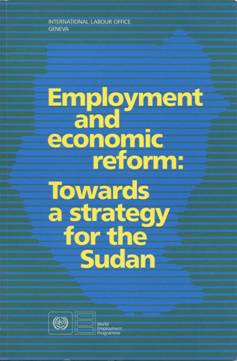Economic Policies in Sudan
Professor Karl Wohlmuth presented a Strategic Framework for Economic Cooperation between Sudan and South Sudan in a Plenary Session at the International Sudan/South Sudan Studies Conference in Bonn (see the programme). First, he analyzed the growth model of Sudan since Independence and presented the constraints and weaknesses. Second, he emphasized the need to look at the various forms and the levels of interdependence which are persisting between the two states. Beside of the interdependence with regard of the oil sector there are so many other forms, such as the interdependence of the border-states, policy interdependence and the interdependence in environment, climate change adaptation and land policies. Also the persisting causes of conflicts in the two Sudans were discussed, especially the horizontal inequalities between "identity groups" in states, regions, and counties; but also such causes of conflict as vertical inequalities, "creed" and "greed", weak state institutions, lack of commitment and trust, and the duration of conflicts were analyzed and related to the two Sudans. The high degree of interdependence between the two Sudans and the high levels of horizontal inequality with cross-border effects request forms of economic cooperation between the two states. As well, the three basic concepts "strategy", "framework" and "cooperation" were presented with regard of the current issues. Third, the feasibility of and the preconditions for the Strategic Framework were discussed, by looking first at the four major negotiation complexes ("border, oil and hydropower"; "citizenship, refugees, and human rights", "debt, assets and finance"; and "security, demilitarization and stability") and then at the feasibility conditions for such a Framework (when regarding key determinants such as interdependence, external instability, opportunities and options). The merits of such a fully negotiated programme are compared with the "Roadmap" of the African Union Peace and Security Council (AUPSC). Fourth, five core cooperation programmes and five supplementary cooperation programmes were presented; while the core programmes aim at modifying the growth model of the two Sudans, the supplementary programmes support this turn towards a sustainable growth model. Cooperation potentials are outlined for all the ten programmes; there are huge opportunities which can be realized in the long-term. These programmes are based on bottom-up growth strategies and are needed prior to and in addition to the conventional top-down growth strategies; growth diagnostics at state levels is used to pursue the new approach. Fifth, the first steps towards initiating such a programme were also presented.
In a working group chaired by Professor Wohlmuth on the "Economic Development of the Border-States in Sudan and South Sudan" the centrality of these ten states as a powerhouse and as a growth pole on the one side and as a region affected by conflicts and war(s) on the other side was discussed. Proposals for peace, reconstruction and development were presented by the panel speakers. Two experts from the Sudan and two experts from South Sudan were invited and presented their analyses. The growth diagnostics approach was applied to two states in the border-region (Blue Nile State in Sudan and Western Bahr el Ghazal State in South Sudan). Cross-border cooperation of indigenous population groups was outlined with regard of South Kordofan and North Bahr el Ghazal. The history of oil politics was discussed with regard of the political decisions for the location of refineries and oil installations.
The presentation A Strategic Framework for Economic Cooperation between Sudan and South Sudan by Professor Wohlmuth at the International Sudan/South Sudan Conference in Bonn is available as a PDF (Presentation).
The preliminary programme of the World Congress on Sudan Studies was just released (see details unter http://www.iwim.uni-bremen.de/files/dateien/1656_international_sudan_studies_conference_6_provisional_agenda_6_2012.pdf). The programme is composed of plenary sessions and parallel panel sessions. Various important issues of the two Sudan will be discussed with an interdisciplinary focus, and especially so the current political and economic developments in the two states of Sudan will be given attention by a great number of international scholars.
Some of the major issues discussed are: Economic Development of the Border States in Sudan and South Sudan; Border Politics; Old and New National Identities in the two Sudan; Language and Society; New Citizenship; Constitutions; Youth in the two Sudan; Peace and Peace-Building; Security Challenges; Land Issues; South Sudan in the Wider Region; Aid and Development; Economic Issues and Natural Resources; and Water Issues.
The conference is organised by leading researchers on the two Sudan from three research institutions/scientific societies: Dr. Elke Grawert, Bonn International Center for Conversion/BICC, Bonn for the German side, Douglas H. Johnson, Oxford University, for the Sudan Studies Society UK/ SSSUK, and Dr. Abdullahi A. Gallab, Arizona State University, for the Sudan Studies Association USA/SSA USA.
The programme - as it is regularly updated - will be accessible at: http://www.bicc.de/events/2012-2/international-sudan-and-south-sudan-studies-conference.html
A great number of participants from Sudan and South Sudan is also expected to come to Bonn. Because of the dramatic current problems and tensions between Sudan and the newly independent state of South Sudan a great interest of the international press is also expected.
Venue: Rheinische Friedrich-Wilhelms-Universität Bonn, Reginal Pacis-Weg 3, HS 1,7,8,9, Bonn, Germany
Date: 23-25 July 2012
Submission of Abstracts for Papers and Proposals for Panels: The International Sudan Studies Conference will take place this year in Bonn, Rheinische Friedrich-Wilhelms-Universität Bonn, 23-25 July 2012, organized by Dr. Elke Grawert, a former IWIM staff and now working as a senior researcher at BICC in Bonn. The Call for Papers (Link to Call for Papers) invites submissions in line with the general theme of the conference, but also other submissions of interest to researchers on Sudan and South Sudan are welcomed. The three-annual International Sudan Studies Conference of the Sudan Studies Association (SSA) USA and the Sudan Studies Society (SSS) UK will be held at the University of Bonn in Germany. Abstracts of proposed papers, panels and roundtables (please limit to 150-200 words) may be sent to: Dr. Abdullahi A. Gallab, African and African-American Studies, Religious Studies, Arizona State University, Email: abdullahi.gallab@asu.edu. A copy may be sent to Dr. Douglas H. Johnson, Email: douglas@wendoug.free-online.co.uk and to Dr. Elke Grawert, Email: grawert@bicc.de until 31st of March 2012.
Programme: The conference will open with an emphasis on identity, especially issues of gender, citizenship, integration, history, memory and the geographical challenges of the separation. Its second day will be devoted to economic issues, particularly economic development prospects, urbanization and social transformation in Sudanand South Sudan and issues regarding oil, water and other resources. The conference's final day will examine both internal and external power relationships including Sudan-South Sudan relations, old and new conflicts, party formation and strategic and security issues.
Pressemitteilung der Universität Bremen
Nr. 139 / 11. Mai 2011 SC
Süd-Sudan nach dem Bürgerkrieg: Wirtschaft wohin?
Wirtschaftsprogramme für den Süd-Sudan
Sudanforschungsgruppe der Universität Bremen veröffentlicht Studien zur Wirtschaftsreform nach zwei Jahrzehnten Bürgerkrieg
Die Sudanforschungsgruppe der Universität Bremen von Professor Karl Wohlmuth hat jetzt neue Studien vorgelegt, wie der Wiederaufbau der Wirtschaft des Süd-Sudan nach 21 Jahren Bürgerkrieg ermöglicht werden kann. Zwei neue Veröffentlichungen analysieren die Situationen und geben konkrete Handlungsanweisungen für die Gestaltung der Wirtschaftspolitik im Sudan/Süd-Sudan.
In wenigen Wochen am 9. Juli 2011 - wird der Süd-Sudan als 54. afrikanischer Staat seine Unabhängigkeit erlangen. Die Republik Süd-Sudan steht vor gewaltigen politischen, sozialen und ökonomischen Herausforderungen. Viele Fragen im Zusammenhang mit der Abtrennung des Südens von der Republik Sudan sind noch ungeklärt (Fragen der Grenzziehung zwischen dem Norden und dem Süden, Fragen zur Staatsbürgerschaft, zur Verteilung der Öl-Einnahmen zwischen den beiden Staaten, zur Aufteilung der Auslandsschulden und Fragen zur Sicherheit). Insbesondere ist auch das Schicksal von hunderttausenden Binnenflüchtlingen aus der Bürgerkriegszeit zu klären, die im Norden des Sudan leben. Konflikte im Süden um Land und Wasser, auch zwischen Ethnien, destabilisieren den neuen Staat noch vor der demnächst erfolgenden Unabhängigkeitserklärung.
Von ganz entscheidender Bedeutung für den Staatsaufbau wird die schnelle Verbesserung der wirtschaftlichen Lage im Süd-Sudan sein. Konzepte für ein neues Wachstums- und Entwicklungsmodell, die zu mehr Investitionen und zur Reform von zentralen ökonomischen Institutionen führen, sind daher gefragt. Insbesondere geht es darum, die reichlich vorhandenen Ölvorkommen und die natürlichen Ressourcen besser zu nutzen. Die großen Ölvorkommen des Sudan werden gegenwärtig zu 80 Prozent im Süden gefördert, doch der Transport erfolgt über den Norden nach Port Sudan. Auch die Potentiale für die Landwirtschaft, die Forstwirtschaft, die Viehwirtschaft und die Fischwirtschaft sind sehr groß, doch werden diese bisher kaum genutzt.
Die Sudanforschungsgruppe um Professor Karl Wohlmuth hat kürzlich zwei Publikationen fertig gestellt, die auch für die Wirtschaftspolitik im Süd-Sudan wichtig sind. Dr. Berhanu Denu aus Addis Abeba ist der Autor einer umfassenden Studie zur Institutionenreform und zur Investitionsförderung im Sudan. Diese Studie ist jetzt als Band 18 in der Schriftenreihe des Instituts für Weltwirtschaft und Internationales Management (IWIM) im Fachbereich Wirtschaftswissenschaft der Universität Bremen erschienen. Die Studie wurde im Rahmen eines großen Drittmittelprojekts von der VolkswagenStiftung gefördert. In einer zweiten Studie geht Berhanu Denu. auf eine Agenda von dringend notwendigen Institutionen- und Wirtschaftsreformen für den Sudan/Süd-Sudan ein. Der Autor hat mehrere Feldforschungsaufenthalte im Süd-Sudan genutzt, um konkrete Vorschläge für die Verbesserung des Umfeldes für Investitionen zu erarbeiten. Investitionshemmnisse insbesondere institutioneller Art werden sehr detailliert untersucht. Diese Studien werden jetzt den relevanten Entscheidungsträgern im Süd-Sudan (Wirtschaftsexperten, Politiker, Ministerien, Universitäten, Entwicklungshilfeinstitutionen, regionale und internationale Organisationen, Nichtregierungsorganisationen und ökonomische Forschungsinstitute) zur Verfügung gestellt.
In einem weiteren Forschungsvorhaben untersucht Professor Karl Wohlmuth mit Ökonomen aus seinem Netzwerk von Experten im Sudan die Orientierung der neuen Wirtschaftspolitik, die nach der Unabhängigkeitserklärung des Süd-Sudan in den beiden Staaten des Sudan verfolgt werden kann und implementiert werden soll. Dabei geht es insbesondere um Modelle der ökonomischen Kooperation zwischen den beiden Staaten, die zur Vermeidung von politischen Konflikten zwischen den beiden Staaten und innerhalb der beiden Staaten beitragen können.
Weitere Informationen:
Universität Bremen
Fachbereich Wirtschaftswissenschaft
Professor Dr. Karl Wohlmuth
E-Mail: wohlmuth@uni-bremen.de
Telefon: 0421 218-66517
Homepage: www.iwim.uni-bremen.de
Beleg und Bezug der Publikationen:
Denu G. Berhanu, Institutions and Investment in Sudan. Socio-Economic and Institutional Foundations of Reconstruction and Development, Bd. 18, Schriftenreihe des Instituts für Weltwirtschaft und Internationales Management, Lit-Verlag Berlin, 496 Seiten, 2011
Sudan Economy Research Group (SERG) Discussion Papers, No. 39:
An Agenda for Institutional Reforms in Sudan/South Sudan, By Berhanu Denu-G., Sudan Economy Research Group (SERG), University of Bremen and Faculty of Economics, Addis Ababa University, Addis Ababa/ Ethiopia/Bremen, Germany, April 2011, 57 pages
Universität Bremen
Pressestelle
Tel. 0421- 218 - 60150
Fax 0421-218 - 60152
E-Mail presse@uni-bremen.de
Das Projekt wird die Grundlagen der Wirtschaftspolitik im Norden und im Süden des Sudan nach dem Referendum und nach der Unabhängigkeitserklärung des Süd-Sudan detailliert untersuchen. Viele Forschungsergebnisse der Sudanforschungsgruppe SERG in Bremen, die seit 1979 veröffentlicht wurden, können für dieses Projekt mitgenutzt werden. Da bisher weitgehend nur über politische, völkerrechtliche und ethnische Fragen der Teilung des Landes diskutiert wurde und Ökonomen an der Diskussion kaum beteiligt waren, geht es nun auch darum, die zentralen wirtschaftspolitischen Entscheidungen bei der Trennung des Landes und bei der zukünftigen Gestaltung der Wirtschaftspolitik in den beiden neuen Staaten wissenschaftlich zu untersuchen. In einem ersten Schritt werden Studien zu wichtigen Bereichen der ökonomischen Politikformulierung erarbeitet. In einem zweiten Schritt geht es um die Nutzung unseres Netzwerks von Ökonomen, die sich mit dem Sudan beschäftigen, um einen systematischen Diskussionsprozess über die erarbeiteten Studien in Gang zu bringen. In einem dritten Schritt geht es um den Dialog mit den Wirtschaftsministerien und mit an Entwicklungsplänen beteiligten Ökonomen im Norden und im Süden des Sudan. Anträge für Mittelgewährung an Stiftungen zur Durchführung von Workshops und zur Realisierung von Publikationsprojekten werden zeitnah gestellt werden. Die zunächst eingehenden Studien zum Thema werden in der neuen Serie der SERG Discussion Paper Series veröffentlicht werden In einem International Call for Papers werden die an dem Thema interessierten Ökonomen zur Mitarbeit eingeladen.
Interested scholars doing research work on Sudan's economy are invited to submit research papers, commented documents and policy-oriented papers on the economic development perspectives of the two new states in Sudan after the Independence Declaration on July 9, 2011.Sixteen policy areas being of interest for such an exercise were identified (see below). So far the discussion on the Sudan separation issues is limited to political, social, ethnic, and legal considerations. These papers will be reviewed and then published in the New Series of the Sudan Economy Research Group (SERG) Discussion Papers at the University of Bremen. These studies are part of a new research project "Economic Policies in Sudan after the Referendum of 2011".
The purpose of the new research project is to investigate into the new policies that are requested in Sudan after the Independence Declaration of the South Sudan. The economic issues of the separation agenda and of the reconstruction and development agenda in the North and in the South are of interest, but most important is it also to look at the cooperation requirements and opportunities between the North and the South after the Independence Declaration. All papers should therefore look carefully at these issues and at the cooperation agenda as both states will lose in terms of economic development if cooperation and coordination activities are not forthcoming.
In a first step the research papers and the policy-oriented papers will be discussed and published in the new edition of the SERG Discussion Paper Series. Invited are papers according to the list of sixteen areas that were identified as core issues being of particular interest for Sudan's future (see below). In the second step a discussion process will be started on the policy implications of the papers to discuss the issues of the papers according to the main policy areas. The networks of the contributors will be used for this deep exchange of ideas. In the third step a dialogue with economic ministries, civil society institutions, and experts in the North and in the South of the Sudan will be started on these issues to compare and to contrast the insights from the papers with current government policy prescriptions and alternative views and plans on policy formation in Sudan. Applications for financial support were already started to finance the publication activity, the network establishment, and later on the dialogue forums in Khartoum and Juba.
Sixteen policy areas being of interest for such an exercise were identified. Apart from the separation agenda the reconstruction and development agenda is demanding as both the North and the South have to develop growth and development visions, and then on this basis new economic strategies and policies, but also action plans and implementation modalities that are broad-based, comprehensive, socially inclusive and which will reach also the remote regions in the two new states. The North and the South have also to learn from past policy failures, so that the policy failures of the past should be reflected in the papers. The list of issues on such an agenda for future-oriented policies in Sudan is long:
1. Development Strategy and Plan Context
2. Macroeconomic Policy Framework
3. Governance Structure and Administrative Reforms
4. Industrial Sector Development and Policy Reforms
5. Agricultural Sector Development and Policy Reforms
6. Agro-industrial and Agribusiness Development Strategies
7. Oil Sector and Natural Resources Development
8. Public and Private Services Sector Development
9. Labour Market and Migration Policy Reforms
10.Human Development Policies: Education and Health
11.Human Development Policies: Poverty Alleviation and MDGs
12.Infrastructure, ICT and STI Development Strategies
13.Development of Regions and of Urban Areas
14.Foreign Trade and Foreign Investment Policies
15.Regional Economic Integration of Sudan
16.Global Economic Integration of Sudan
In all these policy areas there is demand to base new approaches on visions, strategies and policies, and then to translate all this into action and implementation plans. Most important, for all these policy issues the cooperation agenda for the North and the South should be highlighted, as both new states in Sudan will lose if cooperation is not forthcoming.
Contact:
Professor Dr. Karl Wohlmuth
University of Bremen, Bremen, Germany
Email: wohlmuth@uni-bremen.de
Website: http://www.iwim.uni-bremen.de/
Link zur aktuellen Publikationsliste:
Link zu den SERG Discussion Papers:
http://www.iwim.uni-bremen.de/publikationen/pub-sudan.htm
Major Essays on Productive Sector Development in Sudan by Professor Karl Wohlmuth
Wohlmuth, Karl, 1989, Sudan's Industrialisation after Independence:
A Case of Africa's Crisis of Industrialisation, pp. 357 - 379, in: Nurul
Islam (Ed.), The Balance between Industry and Agriculture in
Economic Development, Volume 5, Factors Influencing Change,
Houndmills et al.: The Macmillan Press LTD in association with the
International Economic Association 1989
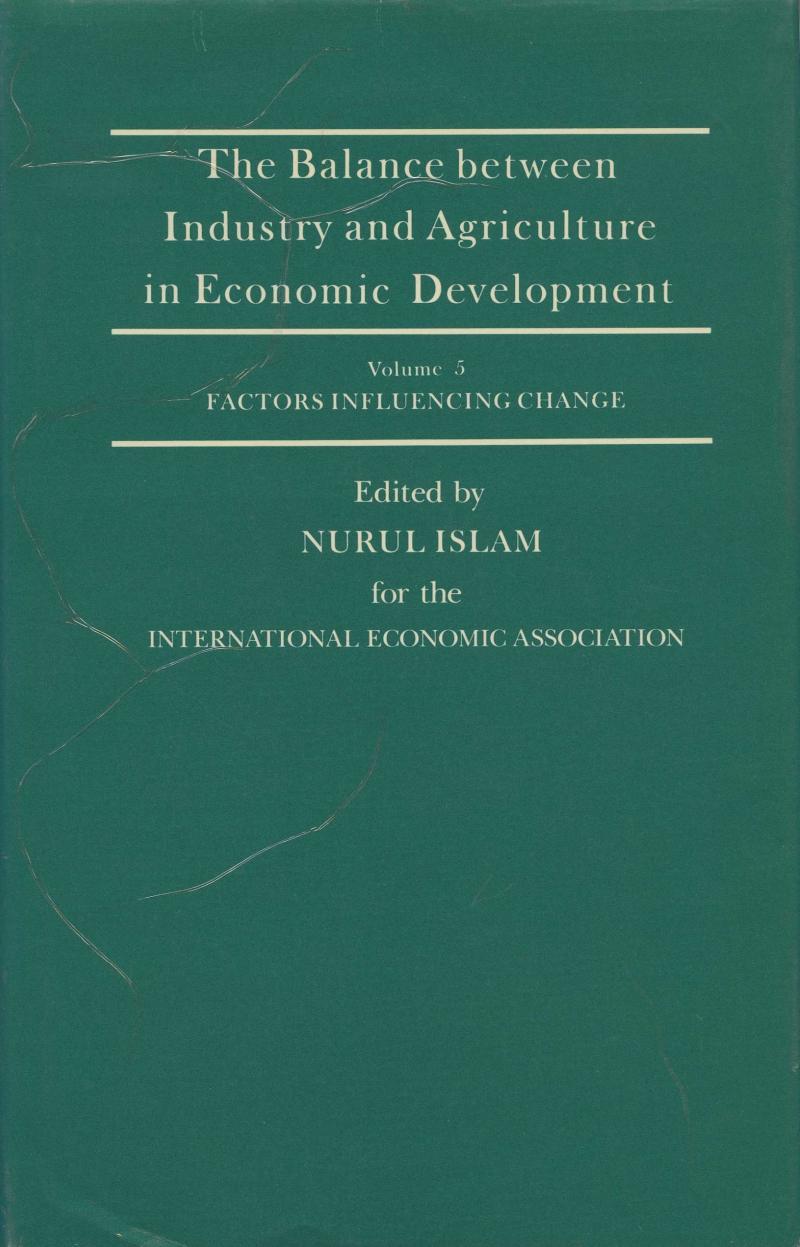
Wohlmuth, Karl, 1991, National Policies for Agriculture, pp. 436 -
454, in: G. M. Craig (Ed.), The Agriculture of the Sudan, Oxford et al.:
Oxford University Press 1991

Wohlmuth, Karl, 1994, Alternative Economic Strategies for the
Sudan, pp. 204 - 247, in: Sharif Harir/Terje Tvedt (Ed.), Short-Cut To
Decay, The Case of the Sudan, Uppsala: Nordiska Afrikainstitutet
1994

Wohlmuth, Karl/Peter Oesterdiekhoff, Eds., 1983, The Development Perspectives of the Democratic Republic of Sudan, The Limits of the Breadbasket Strategy, IFO-Institut Für Wirtschaftsforschung München, Abteilung Entwicklungsländer, Afrika-Studien 109, München/Köln/London: Weltforum Verlag
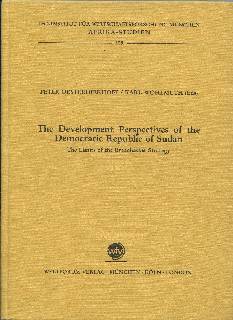
Wohlmuth, Karl/Rainer Tetzlaff, Hrsg., 1980, Der Sudan, Probleme und Perspektiven der Entwicklung, Darstellungen zur internationalen Politik und Entwicklungspolitik 4, Institut für Internationale Angelegenheiten der Universität Hamburg, Frankfurt am Main: Alfred Metzner Verlag GmbH
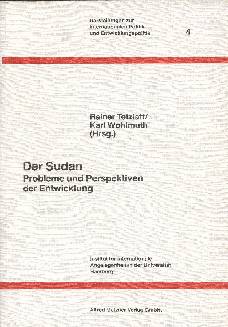
Wohlmuth, Karl /Wauschkuhn, Markus (Hrsg.), 1995, "Die Sudanforschung in der Bundesrepublik Deutschland", Schriftenreihe des Instituts für Weltwirtschaft und Internationales Management, Bd. 2, Lit-Verlag, Münster und Hamburg 1995
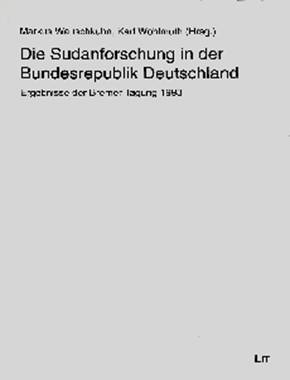
ILO (International Labour Office), 1987, Employment and economic reform: Towards a strategy for the Sudan, Report to the Prime Minister of a mission financed by the United Nations Development Programme and organised by the International Labour Office/Jobs and Skills Programme for Africa, August-September 1986, Geneva: International Labour Office, 172 pages
